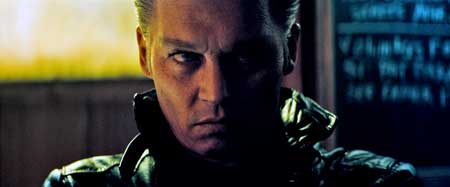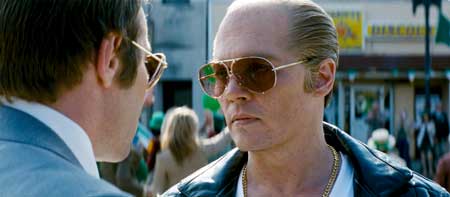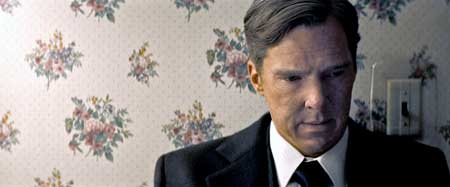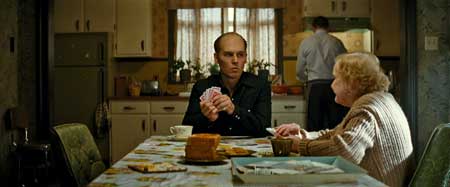Film (2015)
Directed by Scott Cooper
Screenplay: Jez Butterworth, Mark Mallouk
Based on the book
Black Mass: The True Story of an Unholy Alliance Between the FBI and the Irish Mob (2001) by Dick Lehr and Gerard O’Neill
With Johnny Depp (James “Whitey” Bulger), Benedict Cumberbatch (Billy Bulger), Joel Edgerton (John Connolly), Mary Klug (Ma Bulger)

in “Black Mass”
Photo: Courtesy of Warner Bros.
© 2015 WARNER BROS. ENTERTAINMENT INC.
Johnny Depp as Boston crime boss Whitey Bulger and Benedict Cumberbatch as his beleaguered politician brother Billy Bulger give outstanding performances of their characters in this somewhat satisfying account of Whitey’s complicated relationship with police and federal agents.
The complicated and conflicted attempts of those agents, principally John Connolly (Joel Edgerton), to both work with and against Whitey are conveyed with drama but some degree of ambiguity. Connolly’s character provides a focus for this interesting but not completely compelling account of that seduction and entrapment which does not quite delineate where the boundaries of the law are crossed.
Nevertheless, Depp’s performance as Whitey is outstanding – restrained, complex, subtle, not at all garish or overplayed. He nails a quiet, controlled and unsettling aspect of the gangster’s sensibility, drawing into himself yet outwardly horrifying in one fell swoop. As histrionic as Depp can be in some roles, he is absolutely the opposite here, gesturing with microscopic movements in ways that lure one into the character’s sociopathic self while, appropriately, not quite providing the key.

Johnny Depp as Whitey Bulger
in “Black Mass”
Photo: Courtesy of Warner Bros.
© 2015 WARNER BROS. ENTERTAINMENT INC.
In Martin Scorsese’s compelling The Departed (2006), Jack Nicholson offers a grim and outlandish portrayal of Frank Costello, a character largely based on Whitely Bulger. It is interesting, dark and broad, riveting in its own terms but not as quietly insidious as Depp’s subtly poisonous depiction of Whitey here.
Cumberbatch is equally nuanced as brother Billy Bulger, not going over the top but creating a taut and contained account of a brother in the public eye who has to navigate between family fidelity and the requirements of civic responsibility.
Both of these great actors work from the inside out with their characters, not stooping, noticeably, to create awful renditions of Boston accents, but gracefully entering the realm of these tragically paired siblings whose humble roots and connections with their neighborhood of origin are never far from the sense of who they are.

in “Black Mass”
Photo: Courtesy of Warner Bros.
© 2015 WARNER BROS. ENTERTAINMENT INC.
The story of Whitey’s entrapment and the legal complications surrounding the corruption of agents like Connolly seeking to play both sides of the fence is told with some detail but also enough confusion about the nature of the transgressions that the effect is confusing.
Interestingly, the original emphasis of the article about Bulger written by Boston Globe journalists Dick Lehr and Gerard O’Neill in 1988 was on his relationship with brother Billy. As Lehr and O’Neill dug further into the corrupt relationship between Connolly and Whitey, the focus of the article got shifted towards that and away from the story about the relationship between the two brothers. And that new-found emphasis on the Connolly-Whitey connection was retained in their expansion of the 1988 article in the 2001 book upon which the film is based.

Mary Klug as Ma Bulger
in “Black Mass”
Photo: Courtesy of Warner Bros.
© 2015 WARNER BROS. ENTERTAINMENT INC.
Oddly, it is the original motivating force of that brother story that comes through most forcefully in the film, despite the refashioned focus of the book.
Ultimately, it is Depp’s and Cumberbatch’s portrayals that provide distinctiveness for the film, offering a kind of dance of subtle moves which renders the complex story of how these very different brothers remained, in some ways, connected and committed to the family and to the cultural context in which they were reared.
– BADMan
Leave a Reply